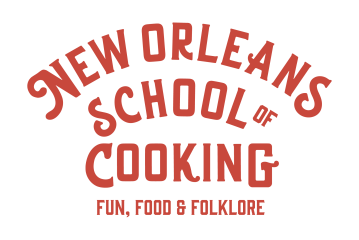The Difference Between Creole & Cajun Food: Cooking in New Orleans

Home to the world-famous Mardigras festival, the city of New Orleans is known for its vibrant history, lively nightlife, incredible jazz music, and of course, its delicious food. While you can find a bite to eat of just about anything in the city, NOLA is perhaps most notable for its flavorful Cajun and Creole cuisines. Commonly interchanged, these two styles of food actually have very distinct flavor profiles! Learn the difference between Creole and Cajun food and taste the unique delicacies of Louisiana with New Orleans School of Cooking classes!
The History of Cajun and Creole Cooking in Louisiana
The state of Louisiana is famous for its unique local cuisines, featuring mouthwatering dishes such as gumbo, etouffee, shrimp creole, and crawfish. Louisiana is often considered one of America’s first melting pots, meaning a society where many different people come together in an area as one. Two notable groups of people that settled in Louisiana include the Cajuns and Creole, each with their own unique heritage, dialect, and, of course, style of cooking!
Cajun Food History
Cajuns found their way to Louisiana in the 18th century. They are the descendants of Roman Catholic French Canadians who were forcefully expelled from Acadia and then settled in the southern region of Louisiana. They are known for their one-of-a-kind dialect, Louisiana French, as well as their unique musical, dance, and culinary traditions. Cajun cooking is often spicier than Creole food. It also relies more heavily on crawfish and pork. Learning to cook Cajun food in New Orleans is truly an unforgettable experience full of authenticity and flavor!
Creole Food History
In Louisiana, the term Creole originally referred to people born in the state before the Louisiana Purchase. These individuals are of mixed heritage, including African, French, German, Italian, and Spanish ancestry. Creole cooking is known for its wide variety of influences from around the world. It also often includes tomatoes, oysters, crab, and shrimp. One of the best ways to experience the rich and vibrant flavors of New Orleans Creole and Cajun-style cooking is during a hands-on cooking class!
Creole Cooking in New Orleans
If you want to experience the best and most authentic Creole food in NOLA, you’ve come to the right place! Creole cooking is known for its use of more traditionally European ingredients such as butter and tomatoes. Some dishes you might find on a Creole restaurant’s menu include shrimp creole, gumbo, jambalaya, and red beans and rice! These dishes can be more complex and often utilize a mixture of French and other European cooking techniques. Creole cooking uses a variety of spices due to the influence of French, Native American, African, and Spanish on the cuisine. If you’re in the mood for something flavorful and want to bring your friends, family, or office party together, check out a private Creole cooking class with the New Orleans School of Cooking!
Authentic NOLA Cajun Food
Cajun food is truly New Orleans’ local cuisine. It incorporates more traditional ingredients, such as rice, sausages, and venison. If you like spice, you’ll love Cajun food! Known to incorporate a heavy mix of cayenne, paprika, garlic, and onion, Cajun cuisine in New Orleans truly packs a punch. Oftentimes, NOLA’s iconic Cajun food focuses on hearty, one-pot style meals. Some famous Cajun dishes include chicken or shrimp etouffee, Louisiana pork boudin, blackened fish, and the classic crawfish boil! Learn to cook Cajun food from the comfort of your own home with an online Cajun cooking class!
Our Cooking Class in New Orleans!
Are you interested in learning more  about the history of Louisiana and its delicious local cuisines? Come visit us at New Orleans School of Cooking! We offer convenient and relaxing cooking demo classes and engaging lab cooking classes perfect for any beginner chef!
about the history of Louisiana and its delicious local cuisines? Come visit us at New Orleans School of Cooking! We offer convenient and relaxing cooking demo classes and engaging lab cooking classes perfect for any beginner chef!
